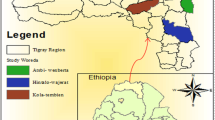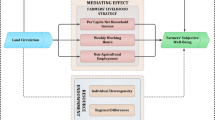Abstract
This study examined the effects of land grabbing on the livelihood of smallholder farming households in Ghana using the Livelihood Effect Index. A structured questionnaire was administered to 560 randomly selected farming households across six regions of Ghana. Analysis of variance was conducted to determine the significance difference in the effects among farming households in the regions and among the livelihood indicators. The empirical results revealed that land grabbing has a significant negative effect on the livelihood of smallholder farming households. Results of the LEI indicate that financial capacity and natural resource of smallholder farming households are the most affected livelihood indicators for the smallholder farming households due to land grabbing activities. Also, the Brong Ahafo region had the highest LEI (0.61), indicating that it is the most affected region by land grabbing. Intervention programmes in the affected regions should be tailored towards strengthening the financial capacity of farming households to minimize the effect of land grabbing on the livelihoods of the smallholders.

Source: Department of Geography and Resource Development, University of Ghana, 2020

Similar content being viewed by others
Notes
The farming households in the regions were as follows: Central, 254,987; Volta, 271,017; Eastern, 354,296; Ashanti, 398,868; Brong Ahafo, 324,778; and Northern, 230,452.
References
Abbink, J. (2011). Ethnic-based federalism and ethnicity in Ethiopia: Reassessing the experiment after 20 years. Journal of Eastern African Studies, 5(4), 596–618.
Adusei, L. A. (2010). Land: The new international strategic asset. How Africa is losing big time. http://www.modernghana.com/news/310058/1/land-the-new-international-strategic-asset-how-afr.html. Accessed 15/1/15.
Alhassan, S. I., Kuwornu, J. K. M., & Osei-Asare, Y. B. (2019). Gender dimension of vulnerability to climate change and variability: Empirical evidence of smallholder farming households in Ghana. International Journal of Climate Change Strategies and Management, 11(2), 195–212.
Alhassan, S. I., Shaibu, M. T., & Kuwornu, J. K. M. (2018a). Is land grabbing an opportunity or a menace to development in developing countries? Evidence from Ghana, Local Environment, 23(12), 1121–1140.
Alhassan, S. I., Shaibu, M. T., Kuwornu, J. K. M., & Damba, O. T. (2018b). Assessing smallholder women farmers’ adaptive capacity to climate change and variability in the Northern Region of Ghana: A Composite Index Approach. Journal of Energy and Natural resource Management, 1, 1–9.
Araya, M. (2013). Effects of large-scale agricultural investments on smallholder farming in Sub-Saharan Africa (case study: Ethiopia). Master’s thesis, School of Economics and Management, Lund University.
Behrman, J., Meinzen-Dick, R., & Quisumbing, A. (2012). The gender implications of large-scale land deals. Journal of Peasant Studies, 39(1), 49–79.
Berend, I. T. (2004). Globalization and its impact on core-periphery relations. California Digital Library, University of California. https://escholarship.org/uc/item/5zn164xm. Accessed 13 July 2018.
Bosch, C., & Zeller, M. (2013). The impacts of wage employment of jatropha plantation on income and food security of rural households in Madagascar—A panel data analysis. Quarterly Journal of International Agriculture, 52(2), 119–140. http://www.agrar.hu-berlin.de/fakultaet/departments/daoe/publ/qjia/contents/2013/2-13/Bosch. Accessed 05/1/2015.
Carney, D. (Ed.). (1998). Sustainable rural livelihoods: What contribution can we make?. London: Department for International Development.
Chizoba, C., Gwen, A., Abiola, O., Chinny, K., & Chike-Jideani, E. (2012). Land grabs and its consequences for rural livelihoods in the Sub-Saharan African region: Agriculture and food security nexus. New Knowledge towards solutions. London: University of Oxford Environmental Change Institute.
Colchester, M., Chao, S., Dallinger, J., Sokhannaro, H. E. P., Dan, V. T., & Villanueva, J. (2011). Oil palm expansion in South East Asia: Trends and implications for local communities and indigenous peoples. Stratford: Forest Peoples Programme.
Cotula, L. (2011). The outlook on farmland acquisitions. International Institute for Environment and Development (IIED). Policy Brief March 2011. http://www.landcoalition.org/sites/default/files/publication/899/IIED_fatmland_web_11.03.10.pdf. Accessed 20/07/14.
Daley, E. (2011). Gendered impacts of commercial pressures on land. Rome: Commercial Pressures on Land; International Land Coalition.
Danso, W. (2015). Land grabbing for jatropha bio-fuel in Ghana; Assessing the impact on households’ livelihood in northern Ghana. Ås: Noragric, Department of International Environment and Development Studies. Norwegian University of Life Sciences.
Department of Geography and Resource Development, University of Ghana. (2020). Map of Ghana showing the study areas. Legon: University of Ghana.
Dheressah, D. K. (2013). The socio-economic and environmental impacts of large scale (agricultural) land acquisition on local livelihoods: A case study in Bako Tibe Woreda of Oromia Region, Ethiopia. Thesis submitted to Centre for Development and the Environment, University of Oslo, Blindern, Norway.
Downing, T. E., Butterfield, R., Cohen, S., Huq, S., Moss, R., et al. (2001). Climate change vulnerability: Linking impacts and adaptation. Nairobi: UNEP.
Ellis, F. (2000). Rural livelihoods and diversity in developing countries. Oxford: Oxford university Press.
Finco, M. V. A., & Doppler, W. (2010). Bioenergy and sustainable development: The dilemma of food security and climate change in the Brazilian savannah. Energy for Sustainable Development, 14(3), 194–199.
Food, Agriculture and Natural Resources Policy Analysis (FANRPAN). (2011). Measuring vulnerability—Challenges and opportunities. FANRPAN, 2(11).
Food and Agriculture Organization, FAO. (2008). Compulsory acquisition of land and compensation. Rome: FAO.
Friends of the Earth. (2011). Europe’s land import dependency. New research reveals extent of land imports from outside the EU. http://www.foeeurope.org/sites/default/files/publications/FoEE_Briefing_Europe_Global_Land_Demand_1011.pdf. Accessed 5/1/15.
German, L., Gumbo, D., & Schoneveld, G. (2012). Large-scale investments in chitemene farmland: Exploring the marginal lands narrative in Zambia’s northern province. New York: European Union and University of Georgia.
Ghana Statistical Service. (2012). 2010 population and housing census. Summary report of final result. Accra: Ghana Statistical Service.
Ghana Statistical Service, GSS. (2014). Ghana living standards survey round 6 (GLSS 6). Poverty profile in Ghana (2005–2013). Accra: Ghana Statistical Service.
Gobena, M. (2010). Effects of large-scale land acquisition in rural Ethiopia: The case of Tako-Tibe Woreda. Thesis submitted to Swedish University of Agricultural Sciences, Department of Urban and Rural Development.
Hughes, A. K., Knox, A., & Jones-Casey, K. (2011). Focus on Land Brief in Africa: Pressure on land from large scale biofuel production. Lesson 2. World Resources Institute in partnership with Landsat Rural Development Institute. Funded by the Bill and Melinda Gates foundation. IFAD OCCASIONAL PAPER 2.
Kansanga, M. M., Arku, G., & Luginaah, I. (2019). Powers of exclusion and counter-exclusion: The political ecology of ethno-territorial customary land boundary conflicts in Ghana. Land Use Policy, 86, 12–22.
Korpi, W., Ferrarini, T., & Englund, S. (2013). Women’s opportunities under different family policy constellations: Gender, class, and inequality tradeoffs in western countries re-examined. Social Politics, 20(1), 1–40.
Lakwo, A. (2006). Microfinance, rural livelihoods, and women’s empowerment in Uganda. African Studies Centre Research report no 85. Ph.D. thesis, Radboud Universiteit, Nijmegen.
Larsen, K. (2009). Knowledge, renewal and religion: Repositioning and changing ideological and material circumstances among the Swahili on the East African coast. Uppsala: Nordiska Afrikainstitututet.
Levidow, L., & Paul, H. (2010). Global agro fuel crops as contested sustainability, part I: Sustaining what development? Capitalism Nature Socialism, 21(2), 64–86.
Lyimo, F. G. (2011). Jatropha production in Tanzania: Opportunities and constraints to small scale farmers in Arusha and Rukwa Regions. A Dissertation submitted in partial fulfilment of the requirements for the degree of master of science in Agricultural Economics of Soloing University of Agriculture, Morogoro, Tanzania.
Margulis, M. E., McKeon, N., & Borras, S. M., Jr. (2013). Land grabbing and global governance: Critical perspectives. Globalization, 10(1), 1–23.
Matondi, P. B., Havnevik, K., & Beyene, A. (2011). Biofuels, land grabbing and food security in Africa. London: Zed Books.
Mutopo, P., Chiweshe, M. K., & Mubaya, C. P. (2015). Livelihoods, gender configurations and large-scale land deals in Zimbabwe. Creating African futures in an era of global transformations: Challenges and prospects, CODESRIA general assemble, 8–12 June, 2015, Dakar, Senegal.
Rahmato, D. (2011). Land to investors: Large-scale land transfers in Ethiopia (No. 1). Addis Abbaba: African Books Collective.
Rapsomanikis, G. (2015). The economic lives of smallholder farmers: An analysis based on household data from nine countries. Rome: FAOUN.
Sassen, S. (2013). When territory deborders territoriality. Territory, Politics, Governance, 1(1), 21–45.
Schoneveld, G. C., German, L. A., & Nutakor, E. (2010). Towards sustainable biofuels development: Assessing the local impacts of large-scale foreign land acquisitions in Ghana (pp. 1–7). Washington, DC: World Bank.
Schoneveld, G. C., German, L. A., & Nutakor, E. (2011). Land-based investments for rural development? A grounded analysis of the local impacts of biofuel feedstock plantations in Ghana. Ecology and Society, 16(4), 10–28.
Scoones, I. (1998). Sustainable rural livelihoods: A framework for analysis. Institute of Development Studies (IDS). Working paper, 72.
Tamrat, I. (2010). Governance of large scale agricultural investments in Africa: The case of Ethiopia. In Washington DC: Paper presented at the annual bank conference on land policy and administration.
United Nations. (2012). Analysis of the recent land acquisitions in West Africa: An opportunity or threat. United Nations Economic Commission for Africa. Sub Regional Office for West Africa (UNECA/SRO-WA). http://41.138.49.23/observatoire/documentation/FINAL%20Land%20Grab_%20ENGLISH_ECA-WA-BOOK-2010-01_Print%20ICE%20march%202012.pdf. Accessed 15/1/15.
Williams, T. O., Gyampoh, B., Kisto, F., & Numara, R. (2012). Water implications of large scale land acquisitions in Ghana. Water Alternatives, 5(2), 243–265.
Woodhouse, P. (2012). Foreign agricultural land acquisition and the visibility of water resource impacts in Sub-Saharan Africa. Water Alternatives, 5(2), 208–222.
Author information
Authors and Affiliations
Corresponding author
Additional information
Publisher's Note
Springer Nature remains neutral with regard to jurisdictional claims in published maps and institutional affiliations.
Rights and permissions
About this article
Cite this article
Alhassan, S.I., Shaibu, M.T., Kuwornu, J.K.M. et al. The nexus of land grabbing and livelihood of farming households in Ghana. Environ Dev Sustain 23, 3289–3317 (2021). https://doi.org/10.1007/s10668-020-00719-9
Received:
Accepted:
Published:
Issue Date:
DOI: https://doi.org/10.1007/s10668-020-00719-9




